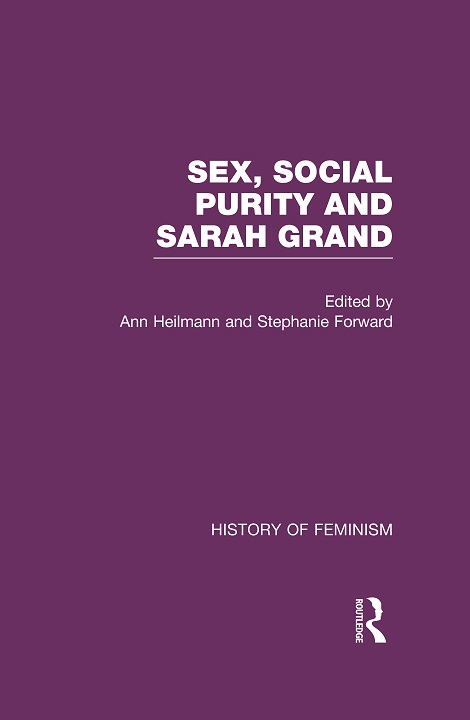Access to the full content is only available to members of institutions that have purchased access. If you belong to such an institution, please log in or find out more about how to order.
Loading content
We were unable to load the content

Sex, Social Purity and Sarah Grand
- Edited by
- Ann Heilmann
- Stephanie Forward
- Published: 28 Sep 2000
- DOI: 10.4324/9780415214100
- Set ISBN: 9780415214100
Sarah Grand was one of the most prominent New Women of the 1890s and a notable social purity feminist and suffragist. This collection offers important insights into the full range of her journalistic output and lesser-known fictional writings. It also makes available biographical and autobiographical material, and previously unpublished manuscript sources.
The first volume reproduces Grand's articles and the contemporary critical reception of her work. The letters in volume two, written mostly in the 1920s and 1930s, shed light on Grand's genesis as a writer and her interaction with 1890s artistic and feminist circles. The third and fourth volumes contain a selection of short stories from three collections published at and after the turn of the century. These comment on some of the explosive issues of that time: feminism, decadence, eugenics, class, race and war. They also reflect Grand's exploration of the interplay between gender and genre.
Set Contents
‘If you mean to make the world listen to you,’ Thomas Hardy wrote to Florence Henniker in 1893, ‘you must say now what they will all be thinking and saying five and twenty years hence: and if you do that you must offend your conventional friends.’ Sarah Grand, he added, had made this principle into the secret of her success: ‘now that they are all alienated she can write boldly, and get listened to.’
Sarah Grand was born Frances Elizabeth Bellenden Clarke on 10 June 1854, at Donaghadee in County Down, Ireland. At that time her father, a naval lieutenant called Edward John Bellenden Clarke, was stationed as a coastguard. The family moved to County Mayo when Frances was still young, and she lived there until she was seven. After Lieutenant Bellenden Clarke’s death in 1861 Mrs Clarke took her children to Yorkshire, but Sarah Grand always recalled certain aspects of her years in Ireland with great affection. For example, in correspondence from her later years she refers repeatedly to her passion for the sea and also to her love of shamrock. Many of her letters written on or near St. Patrick’s Day express her delight in receiving a gift of shamrock to celebrate the occasion.
It was with didactic shorter fiction that Grand started her literary career in the 1870s and ended it in the 1920s. The final two volumes of this set reproduce a choice of stories from Our Manifold Nature (1894), Emotional Moments (1908), and Variety (1922), as well as some of her early writings not included in her later collections. Texts have been selected and arranged with a view to illustrating how her writing developed over time, from a preoccupation with femininity (in particular the collision of New and Old Woman) to the exploration of the way in which gender intersected with other sociopolitical matters (class, race, Empire, and war; eugenics and social hygiene). This volume concentrates on Grand’s early interest in ‘educating’ her target audience: her first published text, Two Dear Little Feet (1873), which is here reproduced in extracts, may serve as a case in point.
‘Diffident young writers’, Sarah Grand wrote in the preface to Our Manifold Nature (1894), ‘cruelly perplexed’ between their own perception of life and the time-honoured truths of ‘those in authority’, ‘crawl along … on feet of lead until the restraint becomes unbearable, and then they break out on their own account in new directions, and their success proves to be the death-blow of their oppressors.”